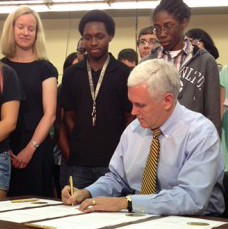A Struggle Of Power At The SBOE Meeting Over Who Does What

Claire McInerny / StateImpact Indiana
Members of the State Board of Education speaking during July's meeting.
Conflict between state superintendent Glenda Ritz and members of the State Board of Education could be its own agenda item at board meetings, after almost two years of conflict between them.
Wednesday’s meeting, which included three resolutions many say aimed to strip Ritz of her power as chair of the board, was no different.
The three resolutions looked at different issues, but all centered around who can do what during meetings.
Disputes over the NCLB waiver process
The most explosive argument came during the discussion around one resolution that involved the board more in future decisions around the No Child Left Behind waiver. This has been a point of contention between many board members, most vocally Brad Oliver, who say Ritz and the Department of Education did not include the board in all aspects of writing the waiver extension.
Ritz said it is not the board’s responsibility to have an active role in things like the waiver since they are supposed to plan education policy. In a long statement where she addressed every point on the resolution, Ritz said the board was aware of the IDOE’s steps to keep the waiver all along the way.
During this discussion, Dan Elsner confronted Ritz, saying she was overstepping her bounds.
“Yes I’m very concerned superintendent, your understanding of leadership and what’s expected of you and what our role is,” he said.
The resolution passed, but details on how the board’s involvement regarding the future of the waiver isn’t clear.
Proposed Changes To SBOE Meeting Procedures
Another resolution looked to change board procedures, and, as we’ve reported, this is at the center of many of the board’s disagreements.
During public comment before discussion of this resolution, many of Ritz’s supporters present at the meeting spoke in favor of Ritz’s role as state superintendent.
Ritz’s supporters waited more than seven hours to speak during the public comment period before one of the motions regarding this resolution.“Some respect should be given to the individual who put her name on a ballot and took that risk and was rewarded overwhelmingly,” said Gail Zeharlis, a member of the Indiana State Teacher’s Association. “Again, we ask you not act on this resolution.”
The resolution called for an ad hoc committee to be created to amend the procedures, but despite the resolution passing Ritz would not allow a meeting to happen Wednesday.
Ritz At Odds With CECI
In her own motions to clarify her responsibilities during board proceedings, Ritz asked to change the wording in a resolution that would create a committee to look at turnaround schools. The original language said the Center for Education and Career Innovation, an educational government agency created by Governor Pence, would appoint the committee. Ritz instead wanted her staff to appoint the members. She says having a separate agency intervene in Department of Education matters is an insult.
“It’s an attempt to actually bring to bear and questions my integrity, my honesty, my departments capacity to do the work of the waiver and perhaps he thinks his agency is the agency that should be doing that,” she said.
Despite their own motions to change wording in other resolutions, many board members criticized Ritz in this instance saying trying to change one word of the resolution was “much ado about nothing.”
THE POLICY DECISIONS THAT WERE MADE
Despite the arguments over how the board operates and who can do what, the ten members of the board present at Wednesday’s meeting walked away accomplishing a few important policy tasks and discussions on pressing issues.
The first is the creation of a task force to meet in the next two weeks to determine the fate of Arlington Community High School in Indianapolis.
The second was learn more about assessment options for the state’s new test to be debuted in the spring of 2015-2016.
Melani Brizzi of the Family and Social Services Administration also presented on the agency’s progress in selection of the five final counties to participate for the new pre-k pilot program. Brizzi said the FSSA plans to announce the finalists by mid-July.

